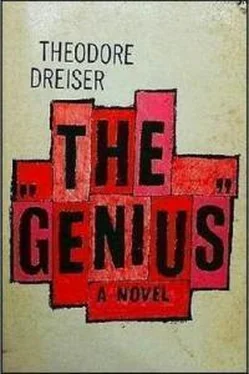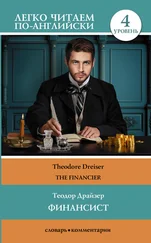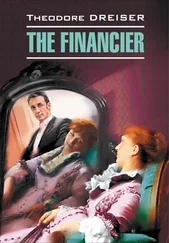Теодор Драйзер - The Genius
Здесь есть возможность читать онлайн «Теодор Драйзер - The Genius» весь текст электронной книги совершенно бесплатно (целиком полную версию без сокращений). В некоторых случаях можно слушать аудио, скачать через торрент в формате fb2 и присутствует краткое содержание. Год выпуска: 2014, Издательство: epubBooks Classics, Жанр: Классическая проза, на английском языке. Описание произведения, (предисловие) а так же отзывы посетителей доступны на портале библиотеки ЛибКат.
- Название:The Genius
- Автор:
- Издательство:epubBooks Classics
- Жанр:
- Год:2014
- ISBN:нет данных
- Рейтинг книги:4 / 5. Голосов: 1
-
Избранное:Добавить в избранное
- Отзывы:
-
Ваша оценка:
- 80
- 1
- 2
- 3
- 4
- 5
The Genius: краткое содержание, описание и аннотация
Предлагаем к чтению аннотацию, описание, краткое содержание или предисловие (зависит от того, что написал сам автор книги «The Genius»). Если вы не нашли необходимую информацию о книге — напишите в комментариях, мы постараемся отыскать её.
The Genius — читать онлайн бесплатно полную книгу (весь текст) целиком
Ниже представлен текст книги, разбитый по страницам. Система сохранения места последней прочитанной страницы, позволяет с удобством читать онлайн бесплатно книгу «The Genius», без необходимости каждый раз заново искать на чём Вы остановились. Поставьте закладку, и сможете в любой момент перейти на страницу, на которой закончили чтение.
Интервал:
Закладка:
"We are led, therefore, to postulate a body of what we may term organizing spirits, who would be charged with the duty of so influencing the myriads of cell souls as to carry out their part of the work with accuracy and certainty….
"At successive stages of the development of the life world, more and perhaps higher intelligences might be required to direct the main lines of variation in definite directions, in accordance with the general design to be worked out, and to guard against a break in the particular line, which alone could lead ultimately to the production of the human form.
"This speculative suggestion, I venture to hope, will appeal to some of my readers as the very best approximation we are now able to formulate as to the deeper, the most fundamental causes of matter and force of life and consciousness, and of man himself, at his best, already a little lower than the angels, and, like them, destined to a permanent progressive existence in a world of spirit."
This very peculiar and apparently progressive statement in regard to the conclusion which naturalistic science had revealed in regard to the universe struck Eugene as pretty fair confirmation of Mrs. Eddy's contention that all was mind and its infinite variety and that the only difference between her and the British scientific naturalists was that they contended for an ordered hierarchy which could only rule and manifest itself according to its own ordered or self–imposed laws, which they could perceive or detect, whereas, she contended for a governing spirit which was everywhere and would act through ordered laws and powers of its own arrangement. God was a principle like a rule in mathematics—two times two is four, for instance—and was as manifest daily and hourly and momentarily in a hall bedroom as in the circling motions of suns and systems. God was a principle. He grasped that now. A principle could be and was of course anywhere and everywhere at one and the same time. One could not imagine a place for instance where two times two would not be four, or where that rule would not be. So, likewise with the omnipotent, omniscient, omnipresent mind of God.
Chapter XXVI
The most dangerous thing to possess a man to the extent of dominating him is an idea. It can and does ride him to destruction. Eugene's idea of the perfection of eighteen was one of the most dangerous things in his nature. In a way, combined with the inability of Angela to command his interest and loyalty, it had been his undoing up to this date. A religious idea followed in a narrow sense would have diverted this other, but it also might have destroyed him, if he had been able to follow it. Fortunately the theory he was now interesting himself in was not a narrow dogmatic one in any sense, but religion in its large aspects, a comprehensive resumé and spiritual co–ordination of the metaphysical speculation of the time, which was worthy of anyone's intelligent inquiry. Christian Science as a cult or religion was shunned by current religions and religionists as something outré, impossible, uncanny—as necromancy, imagination, hypnotism, mesmerism, spiritism—everything, in short, that it was not, and little, if anything, that it really was. Mrs. Eddy had formulated or rather restated a fact that was to be found in the sacred writings of India; in the Hebrew testaments, old and new; in Socrates, Marcus Aurelius, St. Augustine, Emerson, and Carlyle. The one variation notable between her and the moderns was that her ruling unity was not malicious, as Eugene and many others fancied, but helpful. Her unity was a unity of love. God was everything but the father of evil, which according to her was an illusion—neither fact nor substance—sound and fury, signifying nothing.
It must be remembered that during all the time Eugene was doing this painful and religious speculation he was living in the extreme northern portion of the city, working desultorily at some paintings which he thought he might sell, visiting Angela occasionally, safely hidden away in the maternity hospital at One Hundred and Tenth Street, thinking hourly and momentarily of Suzanne, and wondering if, by any chance, he should ever see her any more. His mind had been so inflamed by the beauty and the disposition of this girl that he was really not normal any longer. He needed some shock, some catastrophe greater than any he had previously experienced to bring him to his senses. The loss of his position had done something. The loss of Suzanne had only heightened his affection for her. The condition of Angela had given him pause, for it was an interesting question what would become of her. "If she would only die!" he said to himself, for we have the happy faculty of hating most joyously on this earth the thing we have wronged the most. He could scarcely go and see her, so obsessed was he with the idea that she was a handicap to his career. The idea of her introducing a child into his life only made him savage. Now, if she should die, he would have the child to care for and Suzanne, because of it, might never come to him.
His one idea at this time was not to be observed too much, or rather not at all, for he considered himself to be in great disfavor, and only likely to do himself injury by a public appearance—a fact which was more in his own mind than anywhere else. If he had not believed it, it would not have been true. For this reason he had selected this quiet neighborhood where the line of current city traffic was as nothing, for here he could brood in peace. The family that he lived with knew nothing about him. Winter was setting in. Because of the cold and snow and high winds, he was not likely to see many people hereabouts—particularly those celebrities who had known him in the past. There was a great deal of correspondence that followed him from his old address, for his name had been used on many committees, he was in "Who's Who," and he had many friends less distinguished than those whose companionship would have required the expenditure of much money who would have been glad to look him up. He ignored all invitations, however; refused to indicate by return mail where he was for the present; walked largely at night; read, painted, or sat and brooded during the day. He was thinking all the time of Suzanne and how disastrously fate had trapped him apparently through her. He was thinking that she might come back, that she ought. Lovely, hurtful pictures came to him of re–encounters with her in which she would rush into his arms, never to part, from him any more. Angela, in her room at the hospital, received little thought from him. She was there. She was receiving expert medical attention. He was paying all the bills. Her serious time had not yet really come. Myrtle was seeing her. He caught glimpses of himself at times as a cruel, hard intellect driving the most serviceable thing his life had known from him with blows, but somehow it seemed justifiable. Angela was not suited to him. Why could she not live away from him? Christian Science set aside marriage entirely as a human illusion, conflicting with the indestructible unity of the individual with God. Why shouldn't she let him go?
He wrote poems to Suzanne, and read much poetry that he found in an old trunkful of books in the house where he was living. He would read again and again the sonnet beginning, "When in disgrace with fortune and men's eyes"—that cry out of a darkness that seemed to be like his own. He bought a book of verse by Yeats, and seemed to hear his own voice saying of Suzanne,
"Why should I blame her that she filled my days
With misery …
He was not quite as bad as he was when he had broken down eight years before, but he was very bad. His mind was once more riveted upon the uncertainty of life, its changes, its follies. He was studying those things only which deal with the abstrusities of nature, and this began to breed again a morbid fear of life itself. Myrtle was greatly distressed about him. She worried lest he might lose his mind.
Читать дальшеИнтервал:
Закладка:
Похожие книги на «The Genius»
Представляем Вашему вниманию похожие книги на «The Genius» списком для выбора. Мы отобрали схожую по названию и смыслу литературу в надежде предоставить читателям больше вариантов отыскать новые, интересные, ещё непрочитанные произведения.
Обсуждение, отзывы о книге «The Genius» и просто собственные мнения читателей. Оставьте ваши комментарии, напишите, что Вы думаете о произведении, его смысле или главных героях. Укажите что конкретно понравилось, а что нет, и почему Вы так считаете.









